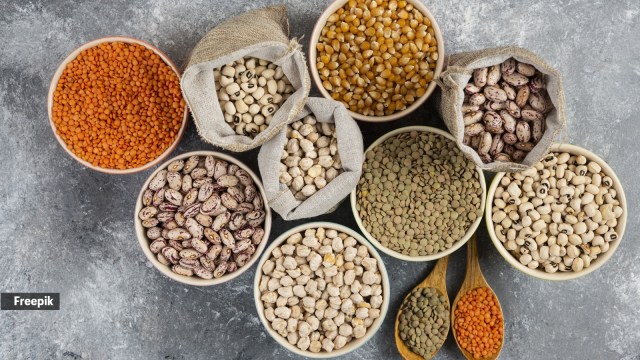📣 For more lifestyle news, click here to join our WhatsApp Channel and also follow us on Instagram
5 common foods that may block your vitamin D absorption, and how to fix it
We spoke with an expert to learn which 5 common foods might interfere with vitamin D absorption and what the mechanism behind their impact is.
 Whole grains and legumes can bind to vitamin D and minerals, making absorption more difficult (Source: Freepik)
Whole grains and legumes can bind to vitamin D and minerals, making absorption more difficult (Source: Freepik)Getting enough vitamin D is essential for bone health, immune function, and overall wellness. While sunlight exposure and supplements can help, certain everyday foods may actually interfere with your body’s absorption of this crucial nutrient. Understanding these interactions can make a real difference in maintaining adequate vitamin D levels.
When we consume foods that hinder vitamin D absorption, even a diet rich in the nutrient or proper supplementation may not be as effective. Factors like fat content, certain minerals, or compounds in some foods can reduce the bioavailability of vitamin D, leaving many unaware that their intake isn’t fully utilised by the body.
We spoke with an expert to learn which 5 common foods might interfere with vitamin D absorption and what the mechanism behind their impact is.
Ashlesha Joshi, fitness dietician and nutritionist at Tone 30 Pilates, tells indianexpress.com, “Certain foods can affect how efficiently the body absorbs or utilises vitamin D.”
According to her, these are:
- Top among them are foods high in phytates, such as whole grains and legumes, which can bind to vitamin D and minerals, making absorption more difficult.
- Excessive caffeine from coffee or tea may also interfere by reducing vitamin D receptor expression in the intestines.
- Alcohol, when consumed regularly, impairs liver function, which is essential for converting vitamin D into its active form.
- Processed foods rich in trans fats and hydrogenated oils can reduce the absorption of fat-soluble vitamins, including vitamin D.
- Finally, very high-fibre diets, though generally healthy, can sometimes reduce absorption efficiency because vitamin D is fat-soluble and requires dietary fats for proper uptake.
 Having vitamin D–rich foods like eggs, salmon, or fortified cereals, along with sources of good fats such as avocado, olive oil, or nuts can enhance uptake (Source: Freepik)
Having vitamin D–rich foods like eggs, salmon, or fortified cereals, along with sources of good fats such as avocado, olive oil, or nuts can enhance uptake (Source: Freepik)
Specific combinations of foods or timing strategies that can enhance vitamin D absorption for those at risk of deficiency
Joshi mentions, “Since vitamin D is fat-soluble, pairing it with healthy fats can significantly improve absorption. For instance, having vitamin D–rich foods like eggs, salmon, or fortified cereals along with sources of good fats such as avocado, olive oil, or nuts can enhance uptake. Including vitamin K2–rich foods like fermented soy or cheese also helps, as it supports calcium metabolism and works synergistically with vitamin D.”
Timing also plays a role, she adds, taking vitamin D supplements or having vitamin D-fortified foods during your main meal of the day, when fat intake is higher, can optimise absorption. Consistent sun exposure, even for a few minutes daily, further boosts vitamin D levels naturally.
Balance your diet to ensure you get enough vitamin D while still enjoying foods that might slightly reduce its absorption
A balanced approach is key. It is not necessary to completely avoid foods that may interfere with vitamin D absorption; instead, focus on moderation and pairing strategies. For instance, if you enjoy high-fibre meals or coffee, simply ensure you also include vitamin D-rich foods and healthy fats in your daily diet.
“Regularly include oily fish, fortified dairy or plant milks, and egg yolks, while maintaining a nutrient-diverse plate. For individuals with limited sun exposure or dietary restrictions, supplements can bridge the gap, but should ideally be taken under professional guidance. The goal is to build an overall pattern that supports nutrient synergy rather than focusing on single-food effects,” concludes Joshi.
DISCLAIMER: This article is based on information from the public domain and/or the experts we spoke to. Always consult your health practitioner before starting any routine.
📣 For more lifestyle news, click here to join our WhatsApp Channel and also follow us on Instagram
- 01
- 02
- 03
- 04
- 05



























